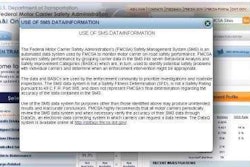U.S. Rep. Peter DeFazio (D-Ore.), ranking member of the House Subcommittee on Highways and Transit, on Thursday, March 10, sent a letter to U.S. Transportation Secretary Ray LaHood questioning the legal authority of DOT to implement a permanent trucking program the United States is negotiating with Mexican officials.
The initial pilot program would allow Mexican trucks to operate on U.S. highways beyond the current border commercial zone, and it would allow Mexican carriers to obtain permanent DOT operating authority after 18 months in the pilot program. That permanent authority would not be rescinded were Congress or the administration to terminate the Mexican truck pilot program.
In addition, DeFazio highlighted his opposition to a proposal to use Highway Trust Fund dollars to pay for the electronic onboard recorders for Mexican trucks in the program. DeFazio argued this proposal would require American taxpayers to subsidize Mexican truck compliance with American safety standards and regulations, and he said this was unacceptable.
“As I have said before, three issues must be addressed in the cross-border trucking program – safety, security and job loss,” DeFazio said. “I appreciate the administration’s attempt to address the very serious safety and security concerns surrounding Mexican trucks, and I am glad we are beginning to address the extortionate Mexican tariffs unfairly slapped on American goods. However, taxpayers should not have to foot the bill for the Mexican trucking industry to comply with American safety standards.
“It is outrageous that we would spend tax dollars to pay for equipment on Mexican trucks, equipment which either the Mexican government or the Mexican carriers themselves should be required to pay,” DeFazio said. “I also question the authority to grant Mexican carriers permanent authority to operate on American roads and highways before a pilot program is complete and the results evaluated.”
Candice Tolliver, communications director for the Federal Motor Carrier Safety Administration, said that during the previous pilot program, U.S. stakeholders were concerned about potential hours-of-service violations by Mexican carriers. “The best way to achieve this high level of oversight is for the United States to own the devices generating the data on Mexican carriers,” Tolliver said. “The alternative would limit FMCSA to onsite compliance reviews for obtaining safety-critical hours-of-service data.”
The two nations will sign the trucking agreement between May and June after conclusion of a 60-day consultation period in both countries, with the first participating Mexican carrier tentatively set to enter the United States in July.
The DOT Office of Inspector General’s February 2009 report on the first cross-border program recommended a cost/benefit analysis on installing GPS on participating Mexican trucks. FMCSA’s 2007 $500,000 contract with the Department of the Army was to obtain and install GPS on participating trucks and have access to the GPS tracking system.












